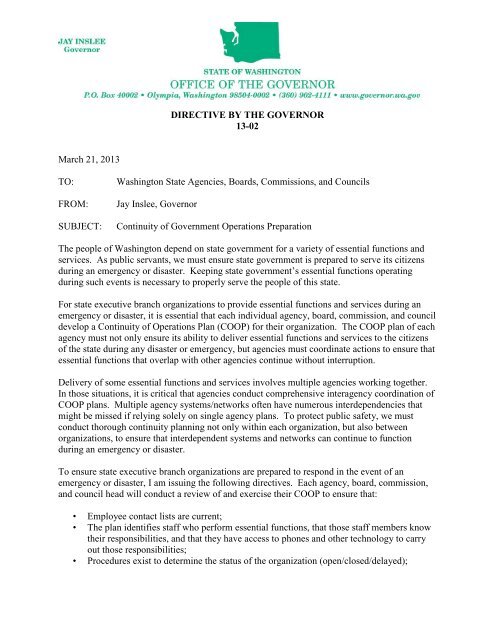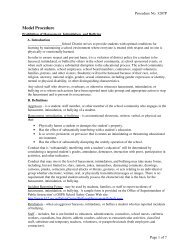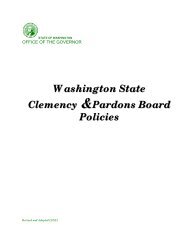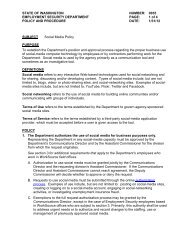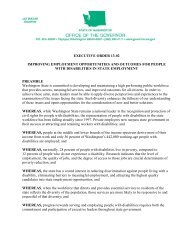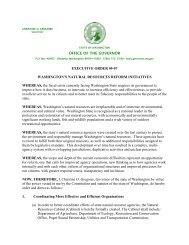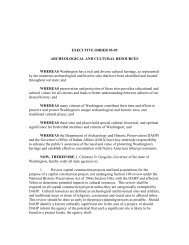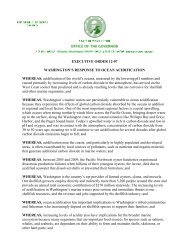DIRECTIVE BY THE GOVERNOR 13-02 March 21, 2013 TO ...
DIRECTIVE BY THE GOVERNOR 13-02 March 21, 2013 TO ...
DIRECTIVE BY THE GOVERNOR 13-02 March 21, 2013 TO ...
Create successful ePaper yourself
Turn your PDF publications into a flip-book with our unique Google optimized e-Paper software.
<strong>DIRECTIVE</strong> <strong>BY</strong> <strong>THE</strong> <strong>GOVERNOR</strong><br />
<strong>13</strong>-<strong>02</strong><br />
<strong>March</strong> <strong>21</strong>, 20<strong>13</strong><br />
<strong>TO</strong>:<br />
FROM:<br />
SUBJECT:<br />
Washington State Agencies, Boards, Commissions, and Councils<br />
Jay Inslee, Governor<br />
Continuity of Government Operations Preparation<br />
The people of Washington depend on state government for a variety of essential functions and<br />
services. As public servants, we must ensure state government is prepared to serve its citizens<br />
during an emergency or disaster. Keeping state government’s essential functions operating<br />
during such events is necessary to properly serve the people of this state.<br />
For state executive branch organizations to provide essential functions and services during an<br />
emergency or disaster, it is essential that each individual agency, board, commission, and council<br />
develop a Continuity of Operations Plan (COOP) for their organization. The COOP plan of each<br />
agency must not only ensure its ability to deliver essential functions and services to the citizens<br />
of the state during any disaster or emergency, but agencies must coordinate actions to ensure that<br />
essential functions that overlap with other agencies continue without interruption.<br />
Delivery of some essential functions and services involves multiple agencies working together.<br />
In those situations, it is critical that agencies conduct comprehensive interagency coordination of<br />
COOP plans. Multiple agency systems/networks often have numerous interdependencies that<br />
might be missed if relying solely on single agency plans. To protect public safety, we must<br />
conduct thorough continuity planning not only within each organization, but also between<br />
organizations, to ensure that interdependent systems and networks can continue to function<br />
during an emergency or disaster.<br />
To ensure state executive branch organizations are prepared to respond in the event of an<br />
emergency or disaster, I am issuing the following directives. Each agency, board, commission,<br />
and council head will conduct a review of and exercise their COOP to ensure that:<br />
• Employee contact lists are current;<br />
• The plan identifies staff who perform essential functions, that those staff members know<br />
their responsibilities, and that they have access to phones and other technology to carry<br />
out those responsibilities;<br />
• Procedures exist to determine the status of the organization (open/closed/delayed);
Directive by the Governor <strong>13</strong>-<strong>02</strong><br />
<strong>March</strong> <strong>21</strong>, 20<strong>13</strong><br />
Page 2<br />
• Procedures exist for updating organizational websites in a timely manner to reflect<br />
current organizational status (open/closed/delayed);<br />
• Procedures exist for internal and external communication when normal methods may be<br />
disrupted, including information on whether the organization is open or closed; and<br />
• Performance of the organizational critical functions, including technology systems that<br />
support those functions, are possible when disruptions occur due to an emergency or<br />
disaster. Actions already performed under Governor Gregoire’s Executive Directive<br />
12-20 fulfill this requirement.<br />
Additionally, each agency, board, commission, and council head will:<br />
• Verify to the Military Department that the specified COOP review and exercise are<br />
complete by May 31, 20<strong>13</strong>.<br />
• Ensure regular updates of organizational COOP. Organizations will update and exercise<br />
continuity plans annually beginning in 20<strong>13</strong> and report completion to the Military<br />
Department. Annual updates to organizational COOP will be completed by June 30 each<br />
year. Actions already performed under Governor Gregoire’s Executive Directive 12-20<br />
for review and exercising fulfill this requirement for 20<strong>13</strong>.<br />
• Designate the person or persons responsible for their agency’s Continuity of Operations<br />
(COOP) and Information Technology Disaster Recovery (DR) responsibilities, if not<br />
already accomplished, and provide contact information for those individuals to the<br />
Military Department by April 30, 20<strong>13</strong>. Actions performed under Governor Gregoire’s<br />
Executive Directive 12-20 for this action fulfill this requirement.<br />
• Complete the Federal Emergency Management Agency Continuity Assistance Tool for<br />
Non-Federal Entities (FEMA P-788 July 2009) which is based on the FEMA Continuity<br />
Guidance Circular 1, by April 30, 20<strong>13</strong>. This assessment becomes the driving force<br />
behind the organizational COOP updates due June 30, 2014. This update should also<br />
include disaster recovery plans for technology systems that support the agency’s essential<br />
functions. Organizations will report progress quarterly (on the 15th of the month<br />
following the calendar quarter) on accomplishment of the Continuity Assistance Tool and<br />
on COOP update to the Military Department beginning April 15, 20<strong>13</strong>, for the period<br />
January 1 to <strong>March</strong> 31, 20<strong>13</strong>.<br />
For my administration, the Interagency Continuity of Operations Committee will be chaired by<br />
The Adjutant General (TAG). He, along with the individual identified by each agency, will<br />
comprise the membership of the Committee, formalized by charter, and should commence work<br />
by April 1, 20<strong>13</strong>. This Committee will coordinate continuity activities (COOP and DR) for the<br />
state and submit progress reports to the Governor’s Chief of Staff through TAG quarterly. In<br />
addition, the Committee will identify potential state level Executive Branch essential functions
Directive by the Governor <strong>13</strong>-<strong>02</strong><br />
<strong>March</strong> <strong>21</strong>, 20<strong>13</strong><br />
Page 3<br />
and interdependencies between agency essential functions. Recommendations that involve<br />
legislative approval will be recommended to and coordinated with the Governor’s Executive<br />
Policy Office. Initial work is to be completed by December 31, 20<strong>13</strong>.<br />
The Interagency Continuity of Operations Committee will promote the use of best practices and<br />
strategies for Continuity of Operations and Disaster Resilience and Recoverability. Using the<br />
results of the organizational reviews and lessons learned, the Committee will identify and<br />
prioritize required policies, methodologies, and initiatives to improve the ability of the state to<br />
provide essential services during an emergency or disaster. These recommendations will be<br />
proposed to the Military Department, Office of the Chief Information Officer, Department of<br />
Enterprise Services, and Consolidated Technological Services, who will set state procedures,<br />
identify standards, tool sets, and solutions necessary to achieve the necessary delivery of service.<br />
The initial list of initiatives and priorities will be presented by the committee by June 30, 20<strong>13</strong>,<br />
with subsequent quarterly review of additional needs and progress against those priorities from<br />
the participating agencies.<br />
I encourage agencies directed by separately elected officials and all two and four year<br />
educational institutions to perform the activities in this directive. Ensuring your performance of<br />
your essential functions during an emergency or disaster is extremely important in fulfilling our<br />
service to the people of this state.<br />
It will take all of us in state government to ensure that we are ready to serve our citizens and<br />
provide vital government services at any time and during any situation.


